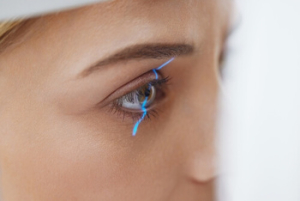Can Cataracts Cause Dizziness? Knowing The Connection
Cataracts are a common eye condition, specifically among older adults. They cloud the eye’s natural lens, affecting vision. But can cataracts cause dizziness?
This article will explore the relationship between cataracts and dizziness, including how cataract symptoms such as depth perception issues, double vision, and contrast sensitivity can affect balance.
We will also discuss cataract surgery as a potential solution, other eye conditions contributing to dizziness, and practical ways to manage vision-related balance problems.
Understanding Cataracts And Their Impact On Vision
 Cataracts occur when the eye’s natural lens clouds, leading to impaired vision. This condition is most common in older adults and develops gradually over time, affecting visual acuity and contrast sensitivity.
Cataracts occur when the eye’s natural lens clouds, leading to impaired vision. This condition is most common in older adults and develops gradually over time, affecting visual acuity and contrast sensitivity.
Cataracts can lead to a variety of visual impairments, including:
- Clouded Vision: Objects may appear blurry or hazy, making it difficult to see clearly.
- Poor Vision In Low-Light Conditions: Older adults with cataracts often struggle to see in dim lighting.
- Double Vision In One Eye: The affected eye may experience overlapping images, leading to disorientation.
- Increased Glare Sensitivity: Bright lights, including sunlight, may cause discomfort and hinder vision.
Can Cataracts Cause Dizziness?
The eyes play a crucial role in maintaining balance and spatial awareness. When cataracts affect vision, the brain may struggle to process visual input correctly, leading to dizziness or an off-balance feeling.
How Depth Perception Affects Balance
Depth perception allows us to judge distances accurately. When cataracts impair this ability, daily activities such as walking downstairs or navigating uneven surfaces may become more difficult, leading to dizziness and an increased risk of falls.
The Role Of Contrast Sensitivity
Contrast sensitivity is the ability to differentiate objects from their background. Cloudy lenses can reduce this ability, making it harder to perceive obstacles and changes in terrain, which can contribute to balance issues.
Visual Acuity And Spatial Awareness
Poor visual acuity caused by cataracts can lead to spatial awareness challenges and disorienting individuals. This disorientation can sometimes manifest as dizziness, especially when moving quickly or turning the head.
Cataract Surgery And Its Impact On Balance
While the primary goal of the procedure is to improve visual acuity, many people also notice an unexpected benefit: a reduction in balance issues.
By enhancing visual clarity, cataract surgery allows the brain to process information more efficiently, often leading to improved spatial awareness and a greater sense of stability.
How Cataract Surgery Affects Balance
After surgery, when vision is clearer, you may find that tasks like walking on uneven surfaces, navigating stairs, or judging distances feel noticeably easier. Improved depth perception can minimise the risk of missteps, making daily activities safer and more comfortable.
For some individuals, especially older adults, the benefits of cataract surgery extend beyond improved eyesight. Treating cataracts may help lower the risk of falls, which is particularly important for those who are at greater risk of injury.
The Adjustment Period After Surgery
Following cataract surgery, some individuals may experience a brief adjustment period as their brain adapts to the new intraocular lens. This adaptation period can vary from person to person, depending on factors such as pre-existing eye conditions, age, and overall health.
During this time, you may notice temporary spatial awareness and balance changes. If you previously relied on clouded vision, your brain will need time to recalibrate and process visual information more accurately.
If you experience persistent dizziness or difficulty adjusting after cataract surgery, it’s important to consult your eye doctor. They can assess whether additional eye exams or corrective measures are needed to optimise your visual clarity and support your overall balance.
Managing Vision-Related Balance Issues
If you have cataracts or other vision conditions, managing vision-related balance issues can significantly improve your quality of life. Here are some key strategies that may help:
Schedule Regular Eye Exams
Your vision changes over time, sometimes so gradually that you may not immediately notice the difference. Scheduling regular eye exams with an eye surgeon is essential for detecting cataracts in their early stages and addressing any vision impairment before it interferes with your daily activities.
If your eyesight is deteriorating, an eye exam can help determine whether you need reading glasses, single-vision spectacles, or a different type of correction. Identifying and treating poor vision early can reduce the risk of balance problems and improve spatial awareness.
Wear The Right Glasses Or Contact Lenses
Wearing the correct glasses or contact lenses is crucial for maintaining visual acuity and preventing balance issues.
If your prescription is outdated, you may experience difficulty judging distances, leading to depth perception errors that can make you feel off balance.
For those with astigmatism, astigmatic correction can also help improve clear vision and reduce visual distortion. Ensuring your prescription is up-to-date allows you to see clearly and move confidently.
Wear Sunglasses To Reduce Glare Sensitivity
Bright sunlight and artificial lighting can cause glare sensitivity, particularly for individuals with cloudy lenses due to cataracts.
This can make it harder to see clearly in low-light conditions or overly bright environments, leading to discomfort and an increased risk of missteps.
Wearing sunglasses with UV protection can help minimise glare, improve contrast sensitivity, and enhance distance vision in outdoor settings. This is particularly beneficial for older adults who may already experience difficulties with visual impairment.
Improve Lighting Conditions At Home And Work
Your surroundings significantly affect your ability to move safely and comfortably. Poor lighting can create shadows and low-visibility areas, making it harder to see obstacles and increasing the risk of falls.
 Enhancing the lighting in your home and workplace can make a substantial difference in maintaining spatial awareness and reducing the likelihood of balance problems. Consider using:
Enhancing the lighting in your home and workplace can make a substantial difference in maintaining spatial awareness and reducing the likelihood of balance problems. Consider using:
- Bright, evenly distributed lighting in hallways and staircases
- Adjustable task lighting for reading and detailed work
- Motion-sensor lights in frequently used areas
- Anti-glare bulbs to reduce eye strain
By taking these simple yet effective steps, you can create a safer environment that supports visual clarity, reduces balance issues, and enhances overall well-being.
If you’re noticing any changes in your vision or experiencing dizziness, it’s always a good idea to consult an eye doctor for a comprehensive evaluation.
Frequently Asked Questions
Is Dizziness Always Related To Vision Problems?
Not necessarily. Dizziness can also result from inner ear issues, neurological conditions, or other health concerns. Consulting an eye doctor can help determine whether vision impairment is a contributing factor.
Can Cataracts Develop At Different Rates In Each Eye?
Yes, cataracts can progress at different rates in each eye. This can create an imbalance in vision, affecting depth perception and making it harder to judge distances. If you’re noticing difficulties with spatial awareness, an eye exam can help determine whether cataract surgery or an updated glasses prescription may be beneficial.
What Should I Do If I Continue To Experience Dizziness After Cataract Surgery?
If dizziness persists after cataract surgery, you must speak with your eye doctor. They can check whether your new intraocular lens is functioning properly, assess any other eye conditions, and ensure that your vision correction is optimised. They may recommend an updated glasses prescription or additional strategies to enhance visual stability if necessary.
Conclusion
While cataracts primarily affect vision, they can also contribute to dizziness by impairing depth perception, contrast sensitivity, and spatial awareness.
For those experiencing significant vision impairment, cataract surgery may be a beneficial option to restore clear vision and potentially improve balance. Regular eye exams, proper eyewear, and maintaining a safe environment can all contribute to better visual health and reduced dizziness.
If you are experiencing vision changes or balance issues, an eye doctor can provide guidance on the best course of action for your eye health and overall well-being.
 If you’ve been experiencing dizziness, balance issues, or vision changes, it may be time for a comprehensive eye exam. Addressing cataracts early can help improve your vision clarity, enhance spatial awareness, and support your overall quality of life.
If you’ve been experiencing dizziness, balance issues, or vision changes, it may be time for a comprehensive eye exam. Addressing cataracts early can help improve your vision clarity, enhance spatial awareness, and support your overall quality of life.
Our experienced team in Melbourne will guide you through your options, whether you need a professional assessment, updated glasses, or expert advice on cataract surgery. Take the first step towards clearer vision and greater confidence in your daily movements.
Call Mornington Peninsula Eye Clinic today at (03) 9070 3580 to book an appointment and discover how improved vision can make a difference in your life!
Note: Any surgical or invasive procedure carries risks. Before proceeding, you should seek a second opinion from an appropriately qualified health practitioner.
Sources
McMillen M 2025. What to Expect From Cataract Surgery. WebMD. Available at: https://www.webmd.com/eye-health/cataracts/what-to-expect-from-cataract-surgery [Accessed March 3, 2025]
Ratini M 2020. Blurred Vision, Dizziness, Fatigue And Loss Of Balance. MedicineNet. Available at: https://www.medicinenet.com/blurred_vision_dizziness_fatigue_and_loss_of_balance/multisymptoms.htm [Accessed March 3, 2025]
Tee-Melegrito R Ann 2024. Can Vision Problems Cause Dizziness? Medical News Today. Available at: https://www.medicalnewstoday.com/articles/can-vision-problems-cause-dizziness [Accessed March 3, 2025]
TerHorst C 2022. Factors to Consider in Choosing an IOL for Cataract Surgery. American Academy of Ophthalmology. Available at: https://www.aao.org/eye-health/tips-prevention/best-artificial-lens-implant-iol-cataract-surgery [Accessed March 3, 2025]






Leave a Reply
Want to join the discussion?Feel free to contribute!